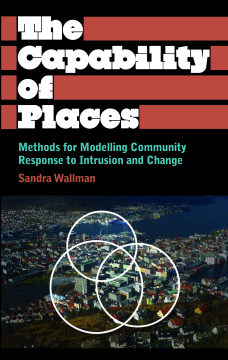
Additional Information
Book Details
Abstract
How can we assess the ability of a place to respond to challenges like migration, recession and disease? Places which seem similar can respond very differently, and with varying degrees of success, to external threats and to the interventions designed to manage them.
In this magisterial work, drawing on decades of research, Sandra Wallman explores how we can measure and compare the resilience of communities, looking in detail at neighbourhoods in London, Rome and Zambia. Each locale is examined as a system which is more or less open or closed; open systems tend to be more resilient when faced with external challenges.
As well as being a fascinating study in its own right, the book includes detailed accounts of the research methods used, as well as a user-friendly typology for classifying local systems, making it an invaluable tool for students, researchers and policy-makers.
'This book is a helpful combination of academic analysis and practical insights'
David Nabarro, United Nations Special Representative on Food Security and Nutrition
'Fieldwork, comparison, team collaboration, longitudinal research - all in one study, and one book! There is a sophisticated ethnographic eye, and a productive synthesis of perspectives from social anthropology and related fields'
Ulf Hannerz is Professor Emeritus of Social Anthropology at Stockholm University. His books include Cultural Complexity (1992), Transnational Connections (1996) and Anthropology's World (Pluto, 2010).
Table of Contents
| Section Title | Page | Action | Price |
|---|---|---|---|
| Cover | Cover | ||
| Contents | vii | ||
| List of Figures and Tables | viii | ||
| Acknowledgements | xi | ||
| 1. Themes and a Model | 1 | ||
| 2. London -Ethnicity or Localism? | 15 | ||
| 3. Rome -Migrants and Migration | 47 | ||
| 4. Zambia -Terrains and Tuberculosis | 80 | ||
| 5. Three Sets of Methods, One Methodology | 111 | ||
| 6. Towards Typology | 124 | ||
| Appendices | 135 | ||
| A - London | 135 | ||
| B - Rome | 144 | ||
| C - Zambia | 145 | ||
| D - Methods | 149 | ||
| Notes | 155 | ||
| References | 165 | ||
| Index | 168 |
